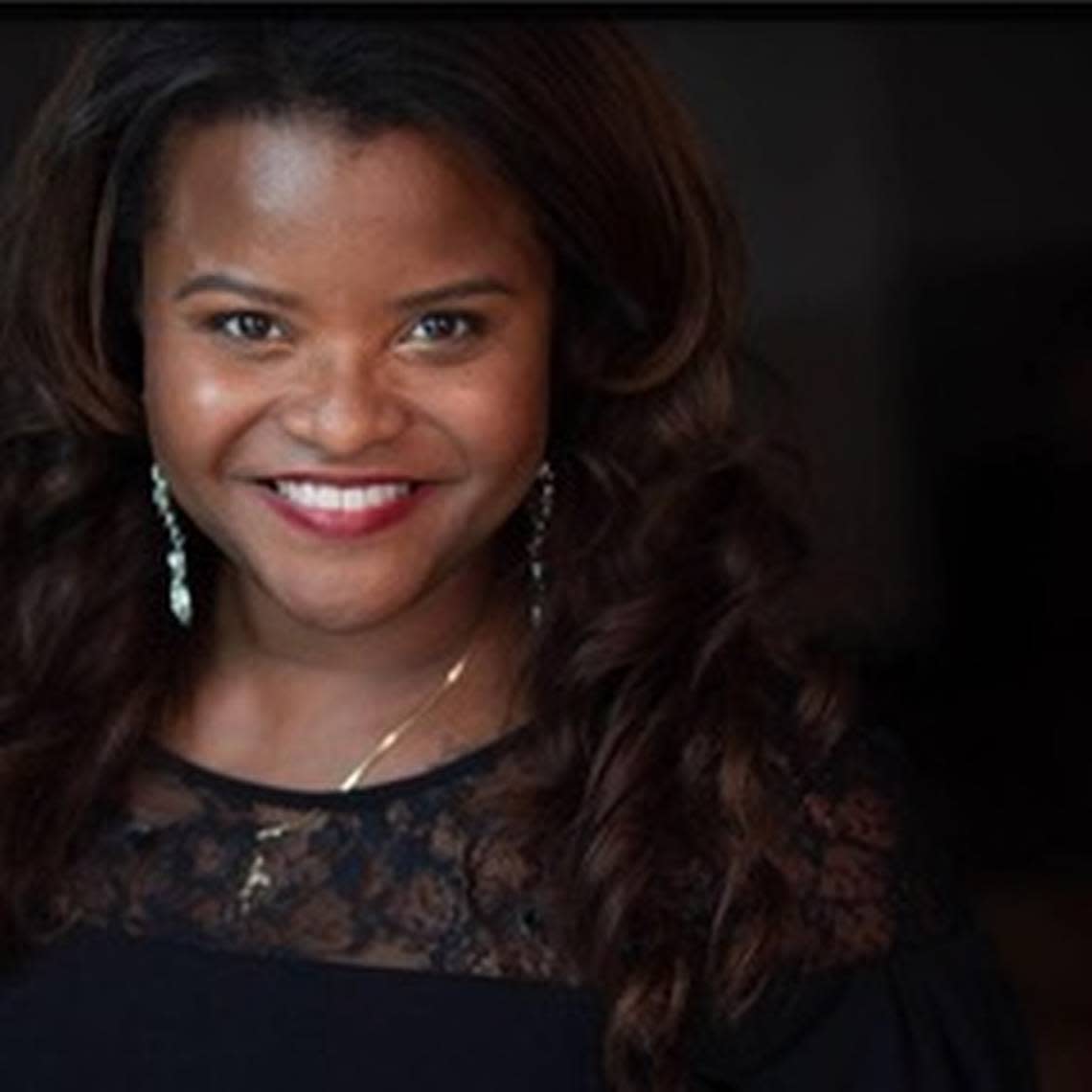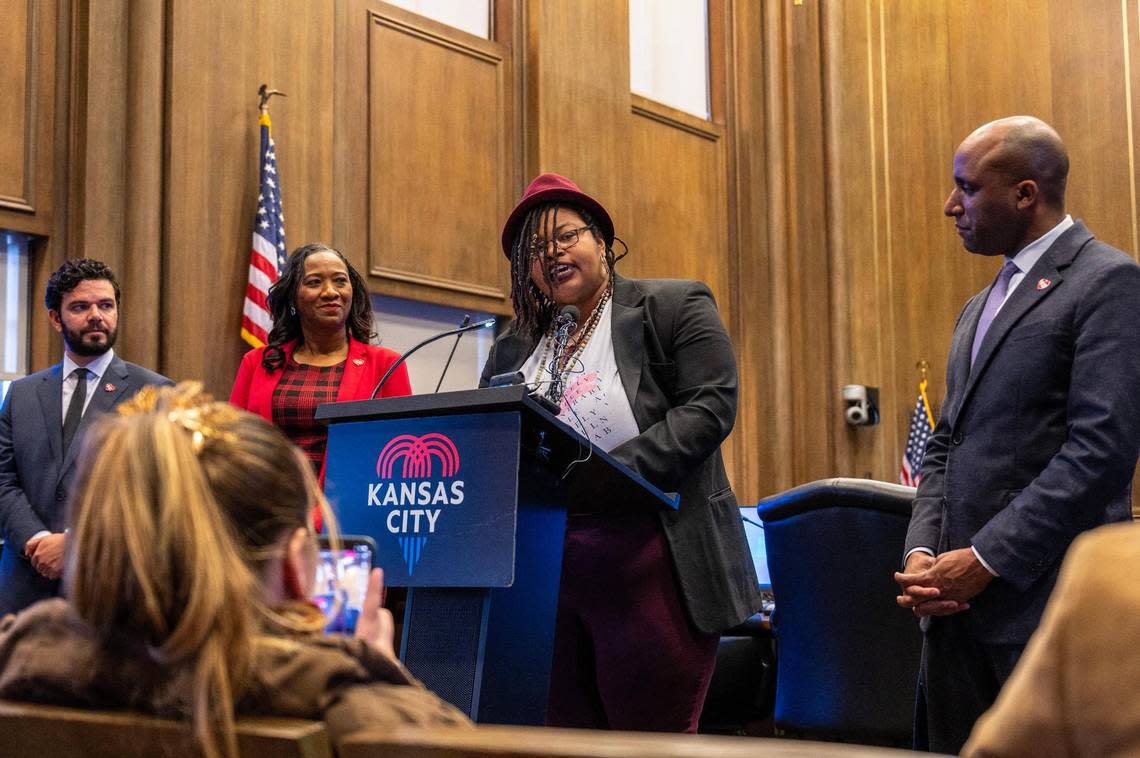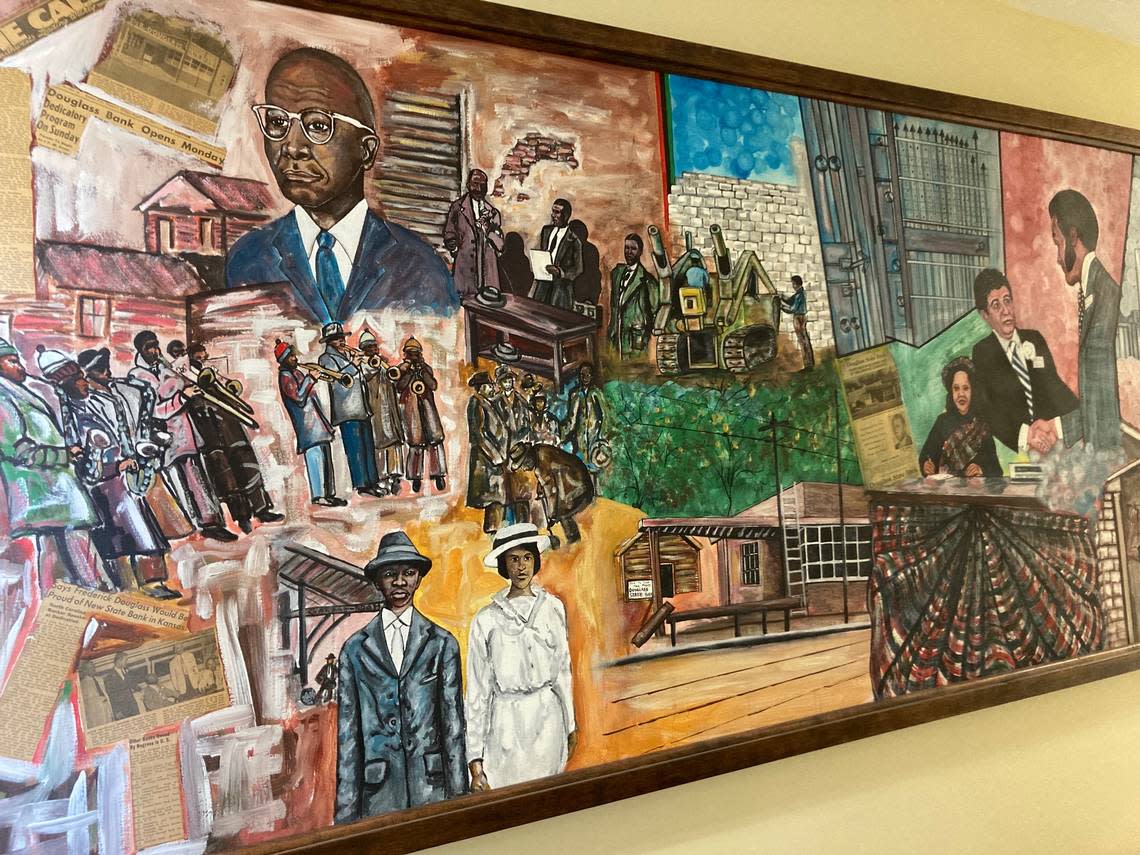The Star shares progress, acknowledges more to do since ‘Truth in Black and White’
After publishing the project “The Truth in Black and White,” The Kansas City Star made a commitment: To fully engage with and better cover our city’s Black communities.
The goal was to take that December 2020 apology acknowledging decades of failed coverage and turn it into real, measurable action.
We promised internal and external changes. Our hope was — and is — that we could build a more honest and trusting relationship with Black Kansas Citians and other historically underrepresented residents in time.
Three years later, we want to share our progress, while acknowledging there’s much more work to do, particularly with news coverage and community engagement.
For the first time in the history of The Star, in the summer of 2023, we hired Black journalists into two of the top three newsroom management positions. Executive Editor Greg Farmer made the appointments with the purpose of building an experienced leadership team that reflects the diversity of all of Kansas City and can help The Star expand its reach.
Andale Gross was named managing editor to lead the day-to-day news operations for our team of nearly 70 journalists. It was a full-circle moment for Gross, a Moberly, Missouri, native whose first job after graduating from the University of Missouri-Columbia was with The Star as an education reporter.
Yvette Walker was named vice president and editorial page editor. She had been assistant dean at the Gaylord College of Journalism and Mass Communication at the University of Oklahoma and a director of news and custom publications for The Oklahoman and newsok.com. She, too, returned to The Star, where she had been a news editor and a former readers’ representative before she left for Oklahoma City.
Two other Black journalists were elevated to key management roles. In January of 2023, Mará Rose Williams was promoted from The Star’s Editorial Board to assistant managing editor for race and equity. And in February of this year, Glenn E. Rice, an investigative reporter and Kansas City native, was promoted to the role of politics and investigations editor.
These hires and promotions are the most visible examples of The Star’s commitment to building bridges of trust and engagement with Black Kansas Citians. But they’re not the only measures of progress.
Community Guidance
“The Truth in Black and White” was conceived as the nation experienced a racial reckoning in the wake of the police killing of George Floyd in Minneapolis.
Immediately after The Star’s apology, the newspaper established the Black Community Advisory Board. The group — a mix of community members and Star journalists — meets once a month to discuss The Star’s coverage and ways the news organization can better serve the community, including through outreach initiatives.
Star leadership regularly seeks guidance from board members as our journalists make decisions on multiple issues involving coverage. Among those consulted are current board members Michele L. Watley and Stacy Shaw.
Watley, who was born and raised in Wyandotte County, Kansas, transitioned from a successful career as a union carpenter to civic advocacy. Currently a public affairs and political advocacy consultant, she founded Shirley’s Kitchen Cabinet.
Shaw is founding attorney of Stacy Shaw & Associates and a social justice advocate. She is passionate about educating the community about the law and providing widespread access to legal services in the Kansas City area.
Among the coverage discussed with Watley and Shaw was The Star’s reporting on how police handled the cases of missing Black women and the related arrest of an Excelsior Springs man charged with kidnapping and rape.
Timothy M. Haslett Jr., who was arrested in October of 2022, is accused of holding a 22-year-old Black woman captive in his basement. He also was later linked to the murder of another Black woman whose body was found in June 2023 in the Missouri River.
In the early stages of the coverage, some community members said The Star and other news outlets were not going deep enough in their reporting. They said the journalists were only relying on what police were saying — that they had no active reported cases of young Black women in Kansas City being missing or killed during that time frame.

Watley and Shaw voiced the same concerns and provided Star editors with helpful feedback that resulted in our stories better reflecting the community’s perspective and putting the police narrative in better context.
Soon after that, Watley and Star leadership hosted a newsroom lunch-and-learn session for Star journalists to discuss how allowing police narratives to dominate a story like this one negatively impacts Kansas City’s Black communities.
“As a reader, I, like many others, was appalled by the coverage of the victim in the Haslett case,” Watley said recently, reflecting on the earlier stories. “I promptly contacted Kansas City leadership to address the concerning reporting gaps, such as missing the opportunity to include perspectives from Black women, girls, and their families, as well as the lack of scrutiny of the police response to the unfolding tragedy in our community.”
Those conversations resulted in meaningful change in The Star’s approach.
“To their credit, KC Star leadership responded with openness and took actionable steps in response to my concerns,” Watley said. “Their willingness to listen and adapt underscores a commitment to improvement.”
When police later decided to name a Black woman as a “person of interest” in the case, The Star chose not to name that woman. Such vague reporting might have led community members to believe the woman was being sought by police as a suspect in the rape and kidnapping case.
We decided publishing her name without more context would be irresponsible. In making our decision, Star editors consulted advisory board members whose counsel was critical in determining the right approach.
The woman, who we in time learned was a witness in the rape and kidnapping case, was the same woman whose body was later found in the river.
“My fellow board members and I consistently stress the need for systemic changes within the newsroom to prevent future oversights,” Watley said. “And while the formation of the advisory board is a crucial first step, it’s just the beginning of a long journey toward repairing yesterday’s harms and forging where all voices, especially those of the Black community, are rightfully heard.”
Shaw said it has been an honor to work with The Star “in preserving more of the American story, which necessarily includes Black perspectives and voices.”
“Board members have contributed over the past three years to the overall shift in perspective and the paradigm through which leadership decisions are made and how communities are engaged and represented in reporting,” she said. “Just like racism is sustained methodically and systemically, correcting systemic racism requires systemic, foundational change. Our progress has been in inches, but the progress is sustainable and I believe the impact will be permanent.”

The advisory board has also encouraged The Star to support the wider local media ecosystem, including Black-owned and activist media outlets. We salute The Call, The Kansas City Defender, The Kansas City Globe and The Next Page KC. Their work plays an important role in our community and results in impactful coverage, including on the stories about the Excelsior Springs and Ralph Yarl cases.
With Yarl, The Star once again found itself on the front lines of a story with race at its core. The 16-year-old Yarl was shot after mistakenly ringing the doorbell at a house that he thought his siblings were visiting.
The Star’s journalists didn’t stop at just covering the April 2023 shooting itself. They explored what residents described as a history of racism in the predominantly white Northland area where the shooting occurred. They talked to relatives of Yarl and followed his recovery.
They kept reporting despite a lack of details early on from police, who didn’t immediately charge Andrew Lester, the 84-year-old white man accused of firing the shots into the Black teenager’s head and arm. In fact, Star reporters worked hard to hold police accountable for initially releasing Lester without filing charges.
And it wasn’t just news coverage that kept The Star on top of the story. The Opinion team compared how police treated Lester and other suspects who committed similar crimes, and the Editorial Board demanded that police get this particular case — which was being watched by the nation — right.
Platforms and Partnerships
We’ve been working to better cover Black Kansas City residents and the stories that matter to them on all our platforms: our website, our app, our printed newspaper, our e-edition, our newsletters and our social media sites.
And we’re telling these stories in a number of ways.

“In the context of print media, ‘black and white’ typically refers to the use of gray scale or monochrome images and text, rather than full color,” said Darron Edwards, lead pastor at United Believers Community Church. “I can definitely see the conscientious effort of The Kansas City Star to move beyond ‘gray scaling’ people, personalities, promotions, and problems.
“A ‘full color’ newspaper has thoughtful content creation like The Kansas City Star. Just remember, full-color reporting and choosing not to monochrome real issues is troubling to some and inspiring to others. I am inspired! Finally.”
In 2021, The Star hired J.M. Banks as culture and identity reporter. Banks, who grew up in the Kansas City area and was a member of the Black Community Advisory Board before he was hired, has brought to the coverage an abundance of stories showcasing Black culture in Kansas City in all its vibrancy and diversity. This has included pieces on a new Black-owned brewery, a gender-fluid musician, the first 18th and Vine Arts Festival, the city’s first poet laureate, and a local dancer who landed a spot with the coveted Alvin Ailey American Dance Theater.

Banks writes a regular feature, Black Lives Remembered, that grew directly out of the apology project. Among concerns we heard was that Star obituaries failed too often to feature Black community members. Working with local funeral directors, Banks shares in The Star the stories of recently deceased, everyday Black citizens who made a difference in their communities.
The commitment to this important work shows up beyond the news coverage. Editorial Board members have been outspoken against racism in Kansas City area school districts, the Board of Parks and Recreation abandoning the street naming process, and the police shooting of unarmed Black men in KCMO.
The Star’s Opinion team has broken developments on the case of Police Detective Roger Golubski who preyed on Black women in Kansas City, Kansas, for years. The team also has produced Lifting Black KC Voices, an ongoing series of guest commentaries by Black authors.
“The Opinion pages are an opportunity for the whole community to share their thoughts and we wanted to begin modeling that both in age and ethnicity,” Walker, the editorial page editor, said. “When several Black high school girls were instrumental in getting the CROWN Act passed in Atchison, Kansas, we invited the girls to write a guest column.”
Watley, the advisory board member, told Star editors about what the girls had accomplished. That prompted the Opinion team to contact the girls’ high school.
“The remarkable initiative of these high school girls was inspiring, and I was thrilled to share their impactful efforts at our Black Community Advisory Board meeting,” Watley said recently. “Witnessing the enthusiasm of KC Star board members, it became clear: Together, we can amplify diverse Black perspectives within the pages of The Kansas City Star.”
Whenever she speaks to underrepresented groups and others about The Star, Walker makes a point to invite those in attendance to write letters to the editor or guest columns. She also has extended that invitation in the Opinion pages.
Another way The Star is connecting with Black Kansas Citians and other underrepresented residents is through On The Vine. The weekly newsletter that includes a column by Williams, the assistant managing editor for race and equity, is emailed to readers who request it.

“I pay close attention to what is being talked about on social media among local and national Black communities and try to write my column from among those issues, concerns or things being applauded,” said Williams, who also includes links in the newsletter to stories about business, politics, local government and entertainment — by a variety of Star journalists — that she thinks will interest her readers.
Beyond the journalism being produced, The Star is spending more time in communities getting to know our neighbors better, another lesson learned from “The Truth in Black and White.”
Star editors frequently attend community events simply as a good-neighbor gesture.
Gross and Walker, since arriving, have spoken to several community groups, including the Urban Summit and the Greater Kansas City Public Relations Society of America.
Listening to and sharing voices
We started a series of listening sessions and meetups during which staff and Star leadership have met with various organizations. They include Generating Income For Tomorrow or GIFT, a nonprofit that supports the growth of Black businesses; Blaque KC, a grassroots movement of parents, teachers, young leaders and advocates focused on improving educational outcomes for Black students; the Black Chamber of Commerce of Greater Kansas City; and the Asian American Chamber of Commerce of Kansas City.
One of our first events was a community conversation that The Star hosted at the Guadalupe Center. Journalists talked with more than a dozen Hispanic community leaders.
We partnered with The Soul of Santa organization run by a Black Kansas City family. For the past two years, at a holiday breakfast and toy giveaway, we provided free family Christmas portraits to those in attendance.

Last year, we partnered with GIFT and KKFI Community Radio and launched Voices of Kansas City, a series of stories broadcast on the radio and published in The Star. We focused on the Black owners of eight small businesses — Mirror Mirror Books, Equal Minded Cafe, Dash Delivery, Ophelia’s Blue Vine Farm, Haul Pros, The Next Paige Talent Agency, Pink Lipps Cosmetics, and Fire and Ice Athletics — and had them share their stories in their own words.
At a mixer to celebrate the business owners and the series, the featured entreprenuers spoke enthusiastically about the positive impact Voices had on them and their businesses.
“It opened a lot of doors for me to share my story in other spaces,” said Dayonne Nicholas Richardson, a local schoolteacher and owner of Mirror Mirror Books.
After the series, Richardson was invited to talk about her children’s books at local churches. She heard from a former professor who saw her story and ordered her books. And she was celebrated by her students and school administration.
“My voice literally was heard,” Richardson said. “I don’t feel like often we get a chance to share the core of our stories so authentically. I’m definitely grateful for the opportunity.”
The Star launched a second Voices series — this one focused on grassroots activists — this month.
Star leadership and staff are keenly aware that the bridges of engagement and trust that will lead to better coverage of our diverse Black communities — and more importantly stronger relationships with them — won’t be fully repaired in just a few years.
This will take time. We want the relationships, the partnerships, the thorough and truthful reporting we are working toward to be sustained.
What we’ve shared may be a good start. But we want Kansas City to know we recognize the road is long. We plan to stay the course, so that Star coverage truly reflects all of us — our communities, our issues, our stories.
To contact members of The Star Leadership Team, send emails to: Greg Farmer, at gfarmer@kcstar.com, Yvette Walker, at ywalker@kcstar.com, Andale Gross, at agross@kcstar.com.
